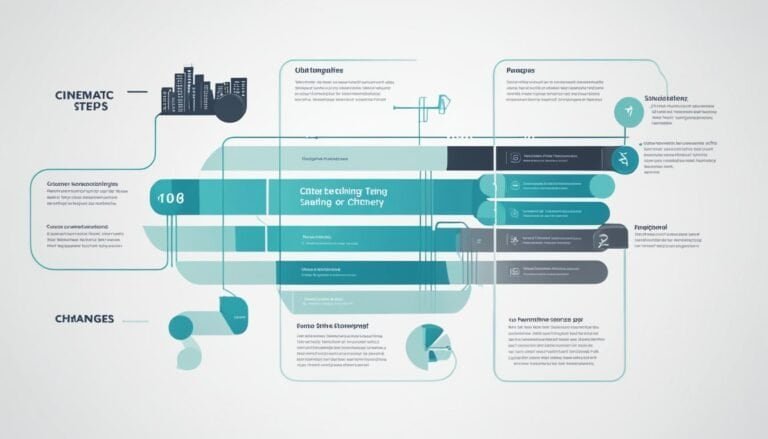Overcoming Social Comparison: Embrace Your Uniqueness
Comparison is a natural human tendency. We often find ourselves comparing our lives, appearances, and achievements with those around us, especially in today’s age of social media. This constant comparison can take a toll on our self-worth and self-esteem, leading to body image issues and a decline in psychological well-being.
But here’s the good news: you have the power to overcome the comparison trap and embrace your uniqueness. By learning to appreciate and accept yourself for who you are, you can cultivate self-confidence, personal growth, and a healthier mindset.
Key Takeaways:
- Comparison can negatively impact your self-worth and well-being.
- Embracing your uniqueness and learning to appreciate yourself is crucial for overcoming social comparison.
- Self-acceptance is the key to breaking free from the comparison trap.
- Practicing gratitude, focusing on your own journey, and surrounding yourself with positivity can help combat comparison.
- Limiting exposure to comparison triggers, such as social media, is important for protecting your self-esteem.
Understanding the Comparison Trap
Comparison has become increasingly prevalent in today’s digital age, largely due to the rise of social media platforms. With just a few clicks, we can instantly access a never-ending stream of images and updates from others’ lives.
Unfortunately, this constant exposure to social media comparison can have detrimental effects on our well-being, particularly when it comes to body image issues and psychological health. Comparing ourselves to others can lead to feelings of inadequacy, low self-esteem, and a distorted perception of our own worth.
When we engage in social media comparison, it often involves scrutinizing our bodies, lifestyle choices, and perceived achievements against those of others. We may find ourselves constantly questioning whether we measure up and feeling pressured to live up to unrealistic standards.
“Comparison is the thief of joy.” – Theodore Roosevelt
The comparison trap not only robs us of our happiness but also prevents us from fully embracing our unique qualities and talents. Instead of celebrating our own journey and accomplishments, we become fixated on what we don’t have or haven’t achieved.
It’s important to recognize that what we see on social media is often a carefully curated highlight reel, carefully selected and edited to present the best versions of people’s lives. This curated perception can distort reality and create a false notion that everyone else is thriving while we are somehow falling short.
It’s time to break free from the comparison trap and prioritize our psychological well-being. By understanding the harmful effects of comparison and learning to navigate social media in a healthy way, we can cultivate a positive self-image, boost our self-esteem, and foster a greater sense of contentment.
| Effects of Social Media Comparison | Impact on Psychological Well-being |
|---|---|
| Feelings of inadequacy | Decreased self-esteem |
| Unrealistic standards | Distorted body image |
| Constant self-comparison | Increased levels of stress and anxiety |
| Self-doubt and insecurity | Negative impact on mental health |
By acknowledging the damaging effects of comparison and striving for a healthier mindset, we can take the first steps towards breaking free from the comparison trap. In the next section, we will explore the power of self-acceptance as a means of overcoming social comparison and fostering personal growth.
The Power of Self-Acceptance
When it comes to overcoming social comparison, self-acceptance holds immense power. It is the key to unlocking our self-worth, self-esteem, and personal growth. By recognizing and embracing both our flaws and strengths, we can develop a positive self-image that forms the foundation for personal fulfillment.
Self-acceptance is the act of acknowledging and embracing who we truly are, without judgment or comparison to others. It means accepting our imperfections, quirks, and unique qualities that make us who we are. When we accept ourselves, flaws and all, we create a solid sense of self-worth and a deep-rooted belief in our capabilities.
It is essential to understand that self-acceptance is not about complacency or settling for less. Instead, it is about acknowledging our current reality and working towards personal growth without the burden of comparison. It allows us to focus on our own progress and journey, rather than constantly seeking validation from external sources.
When we practice self-acceptance, we open ourselves up to immense opportunities for personal growth. It enables us to step out of our comfort zones, take on new challenges, and explore our full potential. With self-acceptance, we become resilient in the face of setbacks and failures, as we recognize that they are essential parts of our journey towards personal development.
“Self-acceptance is a journey that allows us to embrace our true selves and thrive authentically, free from the shackles of comparison.” – Dr. Maya Richards
Cultivating self-acceptance requires practice and patience. Here are a few strategies to help you foster self-acceptance on your journey of personal growth:
- Practice self-compassion: Be kind and gentle with yourself, acknowledging that you are human and deserving of love and acceptance.
- Celebrate your strengths: Recognize your unique talents, abilities, and accomplishments, and celebrate them without comparing them to others.
- Embrace your flaws: Rather than viewing your flaws as weaknesses, see them as opportunities for growth and areas where you can learn and improve.
- Affirmations: Use positive affirmations to reinforce self-acceptance and challenge negative self-talk.
Remember, self-acceptance is a continuous journey. It requires ongoing self-reflection, self-care, and self-compassion. With time and practice, you can develop a profound sense of self-acceptance that truly empowers you on your path to personal growth.
Strategies for Overcoming Comparison
Comparison can be a destructive habit that undermines our self-confidence and hinders personal growth. Fortunately, there are effective strategies you can employ to break free from the comparison trap and cultivate self-acceptance. By implementing these strategies, you can nurture your self-confidence, embrace your unique strengths, and embark on a journey of personal growth.
Embrace Your Unique Strengths
Instead of focusing on what others have or what you lack, recognize and celebrate your own unique strengths. Take time to appreciate your accomplishments, talents, and qualities that make you who you are. Embracing your individuality will help you shift your focus from comparison to self-acceptance, fostering a positive self-image and boosting your self-confidence.
Practice Gratitude
Gratitude is a powerful tool for overcoming comparison. Take a moment each day to reflect on the things you are grateful for in your life. This practice will shift your mindset from chasing what others have to appreciating the blessings and achievements in your own journey. The more you focus on gratitude, the less you will compare yourself to others, allowing for personal growth and self-acceptance.
Compliment Others
Complimenting others not only uplifts them but also helps shift your mindset away from comparison. Instead of feeling envious or inadequate, genuinely appreciate and acknowledge the successes and strengths of others. This practice promotes a positive and supportive mindset, which in turn boosts your own self-confidence and contributes to a healthier personal growth journey.
Consume Positive Messaging
Be mindful of the media and messaging you consume. Surround yourself with positive content that inspires, empowers, and promotes self-acceptance. Avoid media that perpetuates unrealistic ideals or promotes constant comparison. By consciously curating your media intake, you can cultivate a more positive self-perception and foster personal growth.
Focus on Your Own Journey and Progress
Every individual has their own unique path in life. Instead of being consumed by comparison, focus on your own journey and progress. Set personal goals and work towards them, celebrating your achievements along the way. By shifting your attention to personal growth and self-improvement, you will find fulfillment and a sense of accomplishment that is independent of external comparisons.
| Strategies for Overcoming Comparison | Benefits |
|---|---|
| Embrace Your Unique Strengths | Boosts self-confidence and fosters self-acceptance |
| Practice Gratitude | Shifts focus from comparison to appreciation and personal growth |
| Compliment Others | Cultivates a positive and supportive mindset |
| Consume Positive Messaging | Promotes self-acceptance and fosters a positive self-perception |
| Focus on Your Own Journey and Progress | Encourages personal growth and a sense of fulfillment |
Recognizing the Harmful Effects of Comparison
When you constantly compare yourself to others, you expose yourself to a range of harmful effects. These effects can manifest as feelings of jealousy, self-doubt, and inadequacy, taking a toll on your mental and emotional well-being. It’s essential to recognize and understand the negative consequences of comparison in order to break free from its grip.
The harmful effects of comparison often stem from the unrealistic standards and expectations we set for ourselves based on others’ seemingly perfect lives. We tend to focus on the highlight reel presented by others, comparing it to our own behind-the-scenes reality. This creates an unhealthy mindset where we constantly feel like we fall short.
The Jealousy Trap
Comparison can breed jealousy, the burning desire to possess what others have achieved or have. When we constantly compare our own accomplishments to those of others, we may feel envious and resentful, believing that we are lacking in some way. Jealousy can consume our thoughts, breeding negativity and resentment, ultimately hampering our own personal growth.
Self-Doubt and Inadequacy
Constantly comparing ourselves to others can lead to self-doubt, questioning our abilities, worth, and potential. We may fall into the trap of believing that we are not good enough or incapable of achieving what others have. These feelings of inadequacy can hinder our progress, prevent us from pursuing our goals, and limit our potential for success.
“Comparison is the thief of joy.” – Theodore Roosevelt
Comparison not only affects our emotional well-being but can also drive us to adopt unhealthy behaviors. The constant need for validation and approval from others can push us to overwork, seeking validation through our achievements rather than finding true fulfillment. It can drain our energy, diminish our self-worth, and lead to burnout in our personal and professional lives.
Recognizing the harmful effects of comparison is the first step towards breaking free from its destructive cycle. By understanding the negative impact it has on your self-esteem, confidence, and personal growth, you can start to shift your mindset and focus on your own journey towards fulfillment and success.
| Harmful Effects of Comparison | Consequences |
|---|---|
| Jealousy | Feelings of resentment and negativity, hindering personal growth |
| Self-Doubt | Insecurity, questioning abilities and potential |
| Feelings of Inadequacy | Limiting progress and potential for success |
| Unhealthy Behaviors | Overworking, seeking external validation, risking burnout |
Shifting Focus with Gratitude and Self-Compassion
In the pursuit of overcoming social comparison, it’s essential to shift our focus from what we lack to what we have. This shift in perspective enables us to cultivate gratitude and self-compassion, two powerful tools for improving self-worth, mental health, and overall life satisfaction.
Gratitude is the practice of acknowledging and appreciating the positive aspects of our lives. By cultivating gratitude, we become more aware of the abundance and blessings that surround us, even in the face of challenges. This mindset of gratitude allows us to shift our focus away from the constant comparison and longing for what others have, and instead, appreciate the unique gifts and experiences that are present in our own lives.
Self-compassion involves treating ourselves with kindness, understanding, and acceptance. It means acknowledging that we are human, and like everyone else, we have flaws and struggles. By practicing self-compassion, we learn to embrace our imperfections and treat ourselves with the same compassion and empathy we would extend to a loved one. This self-compassionate mindset reminds us that everyone is on their own journey, facing their own battles, and allows us to let go of the need for comparison.
Benefits of Gratitude and Self-Compassion
Cultivating gratitude and self-compassion brings a range of benefits to our mental health and overall well-being:
- Improved Self-Worth: When we focus on gratitude and self-compassion, we recognize our inherent value and appreciate ourselves for who we are, rather than comparing ourselves to others.
- Reduced Negative Emotions: Gratitude and self-compassion help to alleviate feelings of envy, jealousy, and self-doubt that often arise from social comparison.
- Enhanced Resilience: By cultivating gratitude and self-compassion, we develop inner strength and resilience to navigate life’s challenges and setbacks.
- Better Relationships: When we practice gratitude and self-compassion, we approach our relationships with kindness and understanding, fostering deeper connections and empathy.
- Increased Happiness: Gratitude and self-compassion create a positive mindset and promote a greater sense of contentment and happiness in our lives.
Practical Ways to Cultivate Gratitude and Self-Compassion
Here are some practical strategies you can integrate into your daily life to enhance gratitude and self-compassion:
- Gratitude Journal: Take a few minutes each day to write down three things you are grateful for. This simple practice can shift your focus towards the positive aspects of your life.
- Mindful Appreciation: Pay attention to the small joys and moments of beauty in your everyday life. Whether it’s watching a sunset or savoring a delicious meal, savor the present moment and express gratitude for it.
- Self-Care Rituals: Engage in activities that promote self-compassion, such as taking a relaxing bath, practicing mindfulness or meditation, or engaging in hobbies that bring you joy.
- Compassionate Self-Talk: Replace self-critical thoughts with kind and encouraging words. Treat yourself with the same compassion you would offer a close friend.
- Acts of Kindness: Extend kindness to others through acts of service or simple gestures. By spreading positivity, you contribute to a more compassionate and grateful world.
The practice of gratitude and self-compassion requires consistency and patience. With time, you will develop a mindset that allows you to appreciate your own journey, embrace your uniqueness, and let go of the need for comparison. Embrace gratitude and self-compassion as powerful tools on your path to personal growth and well-being.
| Benefits of Gratitude and Self-Compassion |
|---|
| Improved Self-Worth |
| Reduced Negative Emotions |
| Enhanced Resilience |
| Better Relationships |
| Increased Happiness |
Limiting Exposure to Comparison Triggers
Social media has become a powerful platform for comparison, as people often showcase their highlight reels and only the best aspects of their lives. This constant exposure to curated and filtered content can contribute to feelings of inadequacy and negatively impact our self-esteem.
To protect your self-esteem and promote a healthier mindset, it is important to limit your exposure to comparison triggers. Here are some strategies:
- Limit social media use: Set boundaries for the amount of time you spend on social media platforms. Consider taking breaks or implementing designated “detox” days.
- Unfollow triggering accounts: Identify accounts that trigger negative feelings of comparison and unfollow them. Surround yourself with content that promotes positivity and inspires personal growth.
- Avoid situations that trigger comparison: Pay attention to situations or activities that tend to evoke comparison. Whether it’s attending certain events or engaging in specific conversations, choose to prioritize your mental well-being and avoid these triggers.
“Comparison is the thief of joy.” – Theodore Roosevelt
Theodore Roosevelt’s quote reminds us that constantly comparing ourselves to others only diminishes our own happiness. By limiting exposure to comparison triggers, you can focus on your own journey, cultivate self-acceptance, and nurture a positive self-image.
The Benefits of Social Media Detox
Taking a break from social media can be an effective way to detox from the comparison trap. By disconnecting from the online world, you can regain perspective, improve your mental health, and redirect your focus towards activities that truly matter to you.
During a social media detox, you may find that you have more time for self-reflection, engage in meaningful conversations, and rediscover your passions. It allows you to be present in the moment, connect with your own values and goals, and build a greater sense of self-worth.
| Benefits of Social Media Detox | How it Improves Self-Esteem |
|---|---|
| Reduced exposure to curated content and highlight reels | Less comparison and feelings of inadequacy |
| Increased time for self-reflection and personal growth | Enhanced self-awareness and self-acceptance |
| Improved mental health and overall well-being | Greater focus on real-life relationships and experiences |
Surrounding Yourself with Positivity and Support
When it comes to overcoming social comparison, one of the most powerful tools at your disposal is the support and positivity of those around you. The company you keep can have a significant impact on your self-confidence and personal growth. Surrounding yourself with individuals who uplift and encourage you can work wonders in helping you break free from the comparison trap.
Having a strong support system is essential, as it provides a safe space for you to be yourself and celebrates your uniqueness. These individuals support your journey, understanding that everyone has their own path and timetable for success. Their positivity and support foster an environment where you can thrive and grow.
When you have people who believe in you and your abilities, it can boost your self-confidence and help you silence the self-doubt that can arise from comparing yourself to others. Their unwavering belief in you can serve as a reminder of your worth and potential. With their encouragement, you can take bold steps towards personal growth and discover your true capabilities.
Surrounding yourself with positivity and support also means intentionally seeking out those who share uplifting messages and promote a healthy mindset. This includes reading books, listening to podcasts, or following social media accounts that inspire, motivate, and empower. Consuming positive content can reinforce your self-confidence, fuel your personal growth, and remind you of your own unique strengths.
Remember, the journey to overcoming social comparison and cultivating self-confidence is not a solitary one. Lean on the positivity and support of others as you navigate through the challenges and celebrate your victories. Together, you can create a network of resilience and encouragement that propels you towards personal growth and fulfillment.
The Benefits of Surrounding Yourself with Positivity and Support
| Benefits | Description |
|---|---|
| Boosted self-confidence | Belief in yourself and your abilities increases, helping you overcome self-doubt and comparison. |
| Improved mental well-being | Positive influences and a supportive network contribute to better mental health and emotional resilience. |
| Fostered personal growth | Encouragement and support from others create an environment that promotes continuous personal development. |
| Enhanced self-acceptance | Surrounded by positivity, you learn to embrace your uniqueness and accept yourself as you are. |
| Inspiration and motivation | Being around positive and supportive individuals fuels your inspiration and motivates you to strive for success. |
Conclusion
Overcoming social comparison is a journey that starts with embracing your uniqueness and practicing self-acceptance. It is all too easy to get caught up in comparing ourselves to others, especially in today’s social media-driven world. However, by focusing on your own journey and appreciating your individuality, you can break free from the comparison trap and experience personal growth and fulfillment.
One of the key ingredients in overcoming comparison is practicing gratitude. Taking the time to acknowledge and appreciate the things that make you special can shift your mindset from a place of lack to one of abundance. By cultivating gratitude for your own strengths and achievements, you can develop a stronger sense of self-worth and begin to see your own value.
Surrounding yourself with positivity and support is also crucial in this process. Having a support system that uplifts and encourages you can make a world of difference in boosting your self-confidence and promoting personal growth. Seek out individuals who celebrate your uniqueness and inspire you to be the best version of yourself.
Embrace your uniqueness and celebrate your individuality. Remember, personal growth is a lifelong journey, and self-acceptance is an ongoing practice. By focusing on your own progress, practicing gratitude, and surrounding yourself with positivity, you can overcome comparison and unlock your true potential. Embrace who you are and embrace the path of self-discovery and personal fulfillment.






